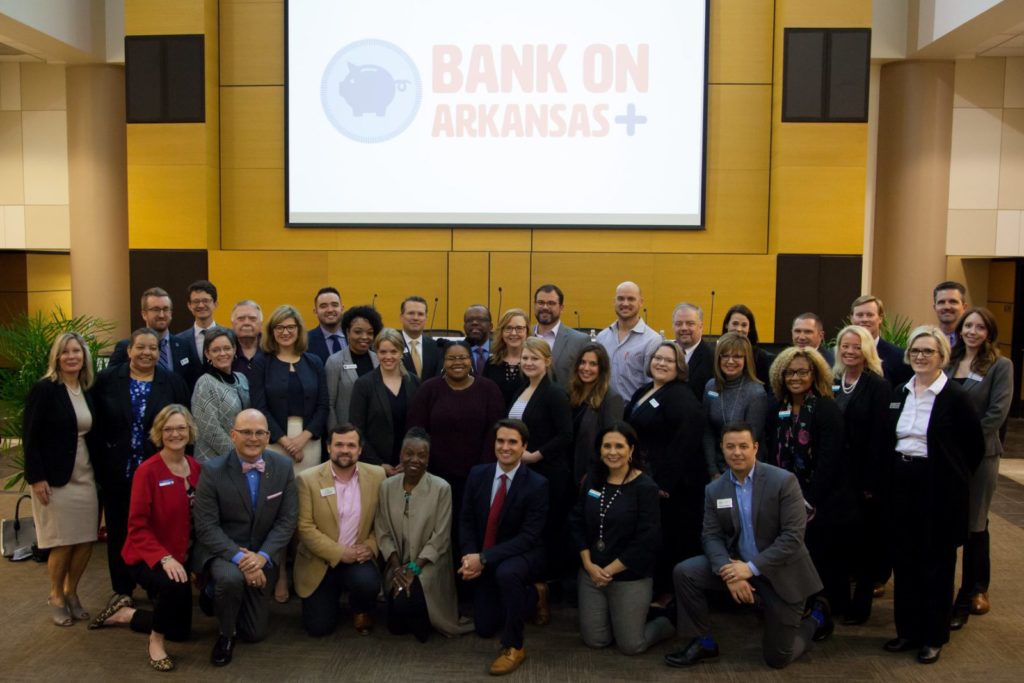Arkansas Times
September 27th, 2018
by Rebekah Hall
For many low-income Arkansans and their families, paying for basic needs — including rent, utilities and food — can mean jumping through costly hoops. Alternative financial services such as payday lenders, pawn shops and check cashing services charge steep fees that add up quickly. The Bank On Arkansas+ initiative hopes to combat this.
The unbanked are defined as individuals and families with no checking or savings account. According to an FDIC national survey, 9.7 percent of Arkansas households were unbanked in 2015. But even some households with bank accounts are still vulnerable to financial predators. That’s why the Bank On movement also targets “underbanked” individuals, meaning people who have a checking or savings account but still used an alternative financial services provider in the past 12 months. The average unbanked individual spends $1,000 a year on alternative financial services, according to Bank On Arkansas+.
In the Arkansas Times’ Big Ideas for Arkansas 2017 issue, Southern Bancorp Inc. CEO Darrin Williams wrote about the need to create a statewide coalition to bring safe banking to the unbanked and underbanked. Now, it’s coming to life. The Arkansas Asset Funders Network, a regional chapter of a nationwide network of grantmakers investing in the economic well-being of low- and middle-income individuals and families, took advantage of the attention Williams’ idea received and seeded the Bank On Arkansas+ coalition.
Many individuals avoid banks because of negative experiences with surprise overdraft fees, high monthly maintenance costs and minimum opening deposits. The same 2015 FDIC national survey shows that the majority of unbanked households think that banks have no interest in serving them, and a significant portion do not trust banks. The problem then lies in restructuring the relationships between unbanked and underbanked individuals and families and the financial institutions that seek to serve them. That’s where Bank On steps up.
The Bank On model is housed at a national nonprofit organization — the Cities for Financial Empowerment Fund — and is employed by 74 coalitions with 24,800 branches nationwide. Bank On has national account standards that each participating financial institution must meet, including minimum opening deposit fees of $25 or less, free mobile and online banking and free deposits. Bank On accounts also cannot be overdrafted, meaning customers won’t be charged surprise insufficient fund fees.
Community partners — ranging from community action agencies to nonprofits of all types, such as the Arkansas Foodbank, the Mexican Consulate, Our House and the Women’s Foundation of Arkansas — refer their clients to participating financial institutions, where they can sign up for safe accounts certified by Bank On and designed specifically for their needs.
“We know from the Bank On model that the best way to encourage those who need to be served by financial institutions is to have that message come from trusted community partners that they already have an established relationship with,” Stephanie Matthews, director of Bank On Arkansas+, said.
Our House Executive Director Ben Goodwin said that helping the nonprofit’s clients make wise financial decisions is a key step in providing a pathway out of homelessness and into independence and self-sufficiency. As a community partner, Goodwin said, Our House looks forward to the progress Bank On products can help their clients make.
“We’re happy to play that role and excited about playing that role. … We want to provide good information to our clients and help them make the wisest decisions about where to put their money,” Goodwin said. “We see our role as providing information and sharing opportunities that we’re able to find in the community, helping our clients understand those opportunities, and to feel like they’re able to exercise their best judgments in making those decisions. Bank On is just one of those opportunities.”
Arkansas will be the first statewide Bank On coalition, and six financial institutions in the state have nationally certified Bank On accounts: Bank of America, Diamond Lakes Federal Credit Union, Iberia Bank, Southern Bancorp, U.S. Bank and Wells Fargo. Four additional institutions are in the account certification process: Citizens Bank, First Community Bank, First Security Bank and Simmons Bank.
After Big Ideas 2017 was published, the AFN used the opportunity to gain support for the initiative, according to Matthews. “The AFN was like, ‘Let’s leverage this article and see who we can get to the table, and who may be interested in exploring this idea,’ ” she said.
Around 70 stakeholders showed up to a meeting held by the AFN at the Federal Reserve office in Little Rock in August 2017, and from there, the AFN began exploring what a Bank On coalition would look like for Arkansas.
Williams said the participation of financial institutions is key to the success of the Bank On Arkansas+ initiative. “That’s why it’s so important for us to complete the network and try to fill in the places where we don’t have financial institutions — because it’s just not convenient for someone who lives in an area that doesn’t have a bank,” he said. “So that’s why, for me, it wasn’t enough for this to be a Little Rock thing, or a North Little Rock thing. It really needed to be a statewide effort.”
Williams said many Arkansans lack physical access to a financial institution. He compared Little Rock’s Heights neighborhood to its 12th Street corridor, a low-income area that is predominately African-American. In the 2.82 square miles of the Heights, there is a population of 5,367 residents and 14 financial institutions. In stark contrast, in the 13 square miles of the 12th Street corridor, there is a population of 25,925 residents and a single financial institution.
Williams said the Bank On Arkansas+ initiative will help the unbanked and underbanked develop financial stability, starting with the ability to save money. “The beginning of improving your financial health really starts with a relationship with a traditional financial institution,” he said. “It is very difficult to save money outside of a traditional bank. It’s not safe. You shouldn’t be burying your money in a coffee can in your backyard, so what banks like Southern do is provide financial literacy and education programs.”
Financial education will also play a role in Bank On Arkansas+, and the initiative will work with “Plus Partners,” such as Credit Counseling of Arkansas, Central Arkansas Development Council and Economics Arkansas to provide services such as financial coaching, budgeting and helping clients navigate their credit scores. “These partners allow us to address financial stability comprehensively … [It] doesn’t stop at connecting individuals to checking accounts,” Matthews wrote in an email.
Williams said he hopes the Bank On Arkansas+ initiative will help build a better financial future for the unbanked and underbanked of the state. “We believe this certified Bank On account is the beginning of helping to improve the financial health of Arkansans,” he said. “When the FDIC does a study down the road, we hope that Arkansas won’t have one in four people underbanked. … We cannot be above national averages on unbanked or underbanked people. That’s what we’re looking for to be successful.”

